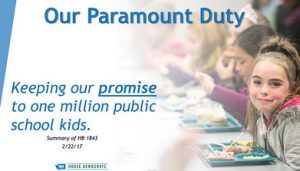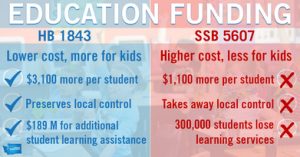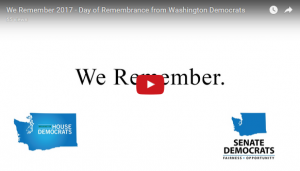Keeping our promise to one million school kids
 After investing nearly $5 billion additional dollars in our public schools over the last six years, Washington is one step closer to keeping its promise to one million school kids.
After investing nearly $5 billion additional dollars in our public schools over the last six years, Washington is one step closer to keeping its promise to one million school kids.
The House of Representatives voted this week to approve HB 1843, a bill that would ensure our schools are fully funded and that every child receives opportunities to learn.
Every element of the House bill was driven by the question – What’s best for kids? – which is why I was a proud YES vote for HB 1843.
Closing the opportunity gap
Our plan takes a significant step toward closing the opportunity gap and improving student outcomes in Washington state by making new investments in:
- Learning assistance to help struggling students keep up with their peers
- Transitional programs to help bilingual students
- Class-size reductions for career and technical education and skill centers
- Parent-involvement coordinators and guidance counselors
A high quality teacher in every classroom
It also addresses the teacher-shortage crisis through educator recruitment and retention investments. The bill makes a serious commitment to our educator workforce by paying new teachers a fair salary, providing additional professional learning opportunities, and ensuring their compensation keeps up with market rates.
 The Senate Republican plan is wrong for kids
The Senate Republican plan is wrong for kids
Unfortunately, the bill that came out of the Senate on a party-line vote has some troubling provisions that I cannot support. The Senate Republican bill:
- Cuts learning support services for low-income kids.
- Reduces teacher pay over time, or increases class sizes. Or both.
- Eliminates local levies for a year, which will significantly impact afterschool programs, sports, clubs, music, and other locally-approved education enhancements.
- Reduces local levy capacity by about two-thirds.
Both sides agree new revenue is needed
Neither plan can be done within existing revenue sources. Democrats and Republicans agree new revenue sources are needed to solve this problem.
The House plan is estimated to cost roughly $7.5 billion over the next four years. In the coming weeks, lawmakers will be unveiling ideas to pay for this proposal. Ideas that have been discussed previously include taxing corporate polluters, out-of-state businesses taking advantage of outdated and wasteful tax exemptions, and capital gains of wealthy investors.
The Senate Republican plan is estimated to cost $8.8 billion over the next four years. Their plan largely relies on a massive property tax hike on middle-class and working families, mostly in King County and the Puget Sound region. And even with their property tax increase, their plan still falls roughly $2.5 billion short of balancing, meaning Republicans must propose cuts to other state services like higher education, public safety, foster care, low-income health care, and housing.
Now that each side has offered proposals, negotiators will work on a path toward compromise that will ensure public schools are fully funded for Washington’s one million school kids.
REAL ID and the TSA signs at airports
If you’ve been to SeaTac Airport, you may have noticed some signs about an upcoming change in ID requirements for boarding a plane and wondered what was going on.
Last December, the federal Transportation Security Administration put up these signs at airports nationwide. The signs speak to a 2018 deadline for Washington state, which isn’t yet compliant with the federal REAL ID law. But nothing is happening this year.
Lawmakers have been working with the governor’s office, the Department of Licensing and other stakeholders to bring Washington into compliance with the REAL ID law and ensure that Washingtonians are able to continue travelling in and out of SeaTac Airport. During today’s meeting, the House Transportation Committee is scheduled to vote on legislation to fix the problem.
Day of Remembrance and standing up to federal executive orders
 On February 19, 1942, President Franklin Roosevelt signed Executive Order 9066. That order resulted in 120,000 Japanese Americans and people of Japanese descent being sent to incarceration camps. They received no trials, were convicted of no crimes, and were held in camps for up to four years because of where their ancestors originated from, and the color of their skin.
On February 19, 1942, President Franklin Roosevelt signed Executive Order 9066. That order resulted in 120,000 Japanese Americans and people of Japanese descent being sent to incarceration camps. They received no trials, were convicted of no crimes, and were held in camps for up to four years because of where their ancestors originated from, and the color of their skin.
This year, we have seen similar forms of discrimination from our federal government. People have been denied entry to the U.S., detained unnecessarily, and even targeted because of where they come from.
We are considering legislation to establish referral resources for those needing information or assistance with immigration matters (HB 2029) and legislation denying the federal government information about religious affiliation, firewalling Washington state from any form of religious registry (HB 2097).
A Personal Note
It has been a busy first month as your new legislator, and the work has just gotten started! Since session began, the House has introduced 1,129 bills, many of which were considered by the 20 House Committees. I’ve served on 3 committees (Education, Healthcare& Wellness and Tech/Economic Development), which voted on a combined 84 bills. Now, bills are continuing through the process and a number will make it to the House floor. If they pass the House, the process starts over again in the Senate and vice versa for bills that come from the Senate.
I always look forward to hearing from you. The highlight of my days continues to be meeting with constituents. Since the beginning of session, I have had more than 140 meetings with over 300 people. People who care about the direction of our district and state.
Thank you for continuing to share your thoughts and ideas with me, and for all you do!
Sincerely,

Rep. Vandana Slatter
